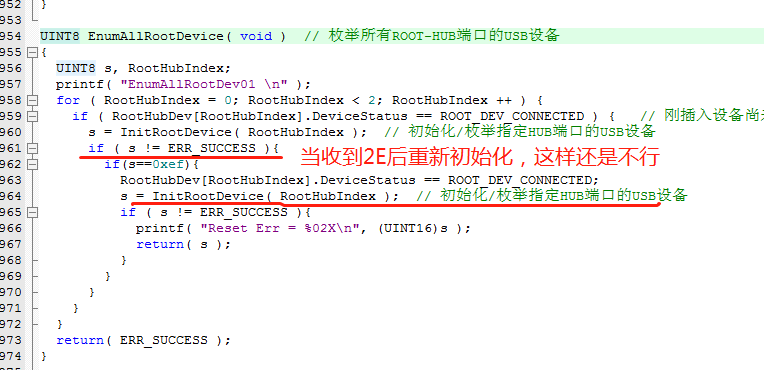又返回来继续检查2E这个问题,我在初始化失败后,再次重新初始化,还是失败。
查看: 5312
回复: 18
CH559 USB 枚举 返回0x2E错误
可以考虑将设备寄过来,我们尝试来操作该设备。联系025-52632854
my code is a bit different because i use my own header files for compiling in Keil, SDCC and IAR but its based on WCH code. Here is the module for sending Control Requests in Hostmode:
/* this module contains the std ctrl requests to get a device enumerated.
The functions are universal written and can be used to enum various
usb devices.
*/
#include "..\inc\mytypes.h"
#include "..\inc\ch559.h"
#include "..\inc\udisklib.h"
extern uint8_t XDATA RxBuffer[];
extern uint8_t XDATA TxBuffer[];
uint8_t DeviceEp0Size; //holds bMaxPacketSize0
#define pSetupReq ((PUSB_SETUP_REQ)TxBuffer) //to be compatible with WCH code
/* perform a Setup request in Hostmode
The function expects a vaild USB setup packet allready prepared in
TxBuffer and then handles the complete request. This includes control
stage, optionaly datastages and finaly the status stage.
Params: [in,out] DataBuf pointer to a buffer for the datastage
[out] Retlen pointer to size of the buffer
Result: ERR_SUCCESS or a some errorcode if the function fails
*/
uint8_t Host_CtrlTransfer(uint8_t XDATA *DataBuf, uint8_t IDATA *RetLen)
{
uint8_t error;
uint8_t remLen;
uint8_t rxLen;
uint8_t stageCnt;
mDelayuS(200);
if (RetLen) *RetLen = 0;
UH_TX_LEN = sizeof(USB_SETUP_REQ);
//
// Setup Stage
//
error = Host_UsbTransact((uint8_t)((USB_PID_SETUP << 4) | 0x00), 0x00, 10000);
if (error) return error;
UH_RX_CTRL = UH_TX_CTRL = bUH_R_TOG | bUH_R_AUTO_TOG | bUH_T_TOG | bUH_T_AUTO_TOG;
UH_TX_LEN = 0x01;
// check if the request has a wlength >= 256
remLen = pSetupReq -> wLengthH ? 0xFF
: pSetupReq -> wLengthL;
//
// Data Stage
//
if (remLen && DataBuf) // is there a data stage at all?
{
if (pSetupReq -> bRequestType & _HOST) // check the direction
{ // GetRequest
while (remLen)
{ // split the RX stages
mDelayuS( 200 );
error = Host_UsbTransact((uint8_t)((USB_PID_IN << 4) | 0x00),
UH_RX_CTRL,
10000);
if (error) return error;
rxLen = (USB_RX_LEN < remLen) ? USB_RX_LEN
: remLen;
remLen -= rxLen;
if (RetLen) *RetLen += rxLen;
for (stageCnt = 0; stageCnt != rxLen; stageCnt ++)
{
*DataBuf = RxBuffer[stageCnt];
DataBuf ++;
}
if ( (USB_RX_LEN == 0) ||
(USB_RX_LEN & (DeviceEp0Size -1))
) break;
}
UH_TX_LEN = 0x00;
}
else
{ // SetRequest
while ( remLen )
{
mDelayuS( 200 );
UH_TX_LEN = remLen >= DeviceEp0Size ? DeviceEp0Size
: remLen;
for ( stageCnt = 0; stageCnt != UH_TX_LEN; stageCnt ++ )
{
TxBuffer[stageCnt] = *DataBuf;
DataBuf ++;
}
error = Host_UsbTransact( USB_PID_OUT << 4 | 0x00,
UH_TX_CTRL,
10000/*200000/20*/ );
if (error) return error;
remLen -= UH_TX_LEN;
if ( RetLen ) *RetLen += UH_TX_LEN;
}
UH_TX_LEN = 0x01;
}
}
//
// Status stage
//
mDelayuS (200);
error = Host_UsbTransact(UH_TX_LEN ? USB_PID_IN << 4 | 0x00
: USB_PID_OUT << 4 | 0x00,
bUH_R_TOG | bUH_T_TOG,
10000);
if (error) return error;
if (UH_TX_LEN == 0) return ERR_SUCCESS;
if (USB_RX_LEN == 0) return ERR_SUCCESS;
return( ERR_USB_BUF_OVER );
}
/* read the device descriptor to learn about bMaxPacketSize0
optionally just allow special devices based on Vendor and Product
to connect.
*/
uint8_t Host_CtrlGetDeviceDescr(uint16_t Vendor,uint16_t Product)
{
uint8_t error;
uint8_t len;
uint16_t id;
//
// first just request 8 bytes since bMaxPacketSize0 is unknown
// this is how OSX is enumerating Win does it a bit different
//
TxBuffer[0]= _HOST | _DEVICE;
TxBuffer[1]= USB_GET_DESCRIPTOR;
TxBuffer[2]= 0x00;
TxBuffer[3]= USB_DEVICE_DESCRIPTOR;
TxBuffer[4]= 0x00;
TxBuffer[5]= 0x00;
TxBuffer[6]= 0x08;
TxBuffer[7]= 0x00;
error = Host_CtrlTransfer(TxBuffer, &len); // perform the request
if (error) return error;
DeviceEp0Size = ((pDeviceDescriptor)TxBuffer) -> bMaxPacketSize0;
if ((Vendor) || (Product))
{
//
// read the complete device descriptor
// to learn about VID / PID
//
TxBuffer[0]= _HOST | _DEVICE;
TxBuffer[1]= USB_GET_DESCRIPTOR;
TxBuffer[2]= 0x00;
TxBuffer[3]= USB_DEVICE_DESCRIPTOR;
TxBuffer[4]= 0x00;
TxBuffer[5]= 0x00;
TxBuffer[6]= sizeof(DeviceDescriptor);
TxBuffer[7]= 0x00;
error = Host_CtrlTransfer(TxBuffer, &len); // perform the request
if (error) return error;
//
// check for matches
//
if (Vendor)
{
id = ((pDeviceDescriptor)TxBuffer) -> idVendorHi;
id = id << 8 | ((pDeviceDescriptor)TxBuffer)->idVendorLo;
if (id!=Vendor) return ERR_USB_UNSUPPORT;
}
if (Product)
{
id = ((pDeviceDescriptor)TxBuffer) -> idProductHi;
id = id << 8 | ((pDeviceDescriptor)TxBuffer)->idProductLo;
if (id!=Vendor) return ERR_USB_UNSUPPORT;
}
}
return error;
}
/* send the configure comand
*/
uint8_t Host_CtrlSetUsbConfig(uint8_t cfg)
{
uint8_t error;
TxBuffer[0]= _DEVICE;
TxBuffer[1]= USB_SET_CONFIGURATION;
TxBuffer[2]= cfg;
TxBuffer[3]= 0;
TxBuffer[4]= 0x00;
TxBuffer[5]= 0x00;
TxBuffer[6]= 0;
TxBuffer[7]= 0x00;
error = Host_CtrlTransfer(NULL, NULL);
return error;
}
/* get the config descriptor
*/
uint8_t Host_CtrlGetConfigDescr(void)
{
uint8_t error;
uint8_t len;
uint16_t wTotalLen;
TxBuffer[0]= _HOST | _DEVICE;
TxBuffer[1]= USB_GET_DESCRIPTOR;
TxBuffer[2]= 0x00;
TxBuffer[3]= USB_CONFIGURATION_DESCRIPTOR;
TxBuffer[4]= 0x00;
TxBuffer[5]= 0x00;
TxBuffer[6]= sizeof(ConfigurationDescriptor);
TxBuffer[7]= 0x00;
error = Host_CtrlTransfer(TxBuffer, &len);
if (error) return error;
if (len < sizeof(ConfigurationDescriptor)) return ERR_USB_BUF_OVER;
wTotalLen = ((pConfigurationDescriptor)TxBuffer)-> wTotalLengthHi;
wTotalLen = (wTotalLen << 8) |
((pConfigurationDescriptor)TxBuffer)-> wTotalLengthLo;
TxBuffer[0]= _HOST | _DEVICE;
TxBuffer[1]= USB_GET_DESCRIPTOR;
TxBuffer[2]= 0x00;
TxBuffer[3]= USB_CONFIGURATION_DESCRIPTOR;
TxBuffer[4]= 0x00;
TxBuffer[5]= 0x00;
TxBuffer[6]= wTotalLen & 0xFF;
TxBuffer[7]= wTotalLen >> 8;
error = Host_CtrlTransfer(TxBuffer, &len);
if (error) return error;
if (len !=wTotalLen) return ERR_USB_UNSUPPORT;
return( ERR_SUCCESS );
}
.....
and then a enum module for a memory stick:
/* enumerate the memory stick
*/
uint8_t Host_EnumMemStick(void)
{
uint8_t error;
// learn about the device ignore VID / PID
error = Host_CtrlGetDeviceDescr(0x0000,0x0000);
if (error) return error;
Debug(printf("DevDesc ok\n"));
// set the USB Address
error = Host_CtrlSetUsbAddress(0x02);
if (error) return error;
Debug(printf("UsbAdr ok\n"));
error = Host_CtrlGetConfigDescr();
if (error) return error;
Debug(printf("CfgDesc ok\n"));
// check the fields
if (((pConfigurationDescriptor)TxBuffer)-> wTotalLengthHi)
{
Debug(printf("wLenght err\n"));
return ERR_USB_UNSUPPORT;
}
// has to be 32 bytes in size
if (((pConfigurationDescriptor)TxBuffer)-> wTotalLengthLo != 0x20)
{
Debug(printf("wLenght != 0x20\n"));
return ERR_USB_UNSUPPORT;
}
// has to be CLASS_MSD
if ((((PUSB_CFG_DESCR_LONG)TxBuffer)->itf_descr.bInterfaceClass) != 0x08)
{
Debug(printf("Class err\n"));
return ERR_USB_UNSUPPORT;
}
// has to be bulk only protocol
if ((((PUSB_CFG_DESCR_LONG)TxBuffer)->itf_descr.bInterfaceProtocol) != 0x50)
{
Debug(printf("protocoll err\n"));
return ERR_USB_UNSUPPORT;
}
// save both bulk eps
if((((PUSB_CFG_DESCR_LONG)TxBuffer) -> endp_descr[0].bEndPointAddress)>0x80)
{
DevEndpOUTAddr = (((PUSB_CFG_DESCR_LONG)TxBuffer)-> endp_descr[1].bEndPointAddress)&0x0f;
DevEndpINAddr = (((PUSB_CFG_DESCR_LONG)TxBuffer)-> endp_descr[0].bEndPointAddress)&0x0f;
}
else
{
DevEndpOUTAddr = (((PUSB_CFG_DESCR_LONG)TxBuffer)-> endp_descr[0].bEndPointAddress)&0x0f;
DevEndpINAddr = (((PUSB_CFG_DESCR_LONG)TxBuffer)-> endp_descr[1].bEndPointAddress)&0x0f;
}
return Host_CtrlSetUsbConfig(((pConfigurationDescriptor)TxBuffer)->bConfigurationValue);
}
i hope that can help
请勿发布广告和违法内容, 代码可以选择编辑器代码语言格式, 更易他人阅读帮助您, 或者留下联系方式,以便更好更快服务您
只有登录才能回复,可以选择微信账号登录
